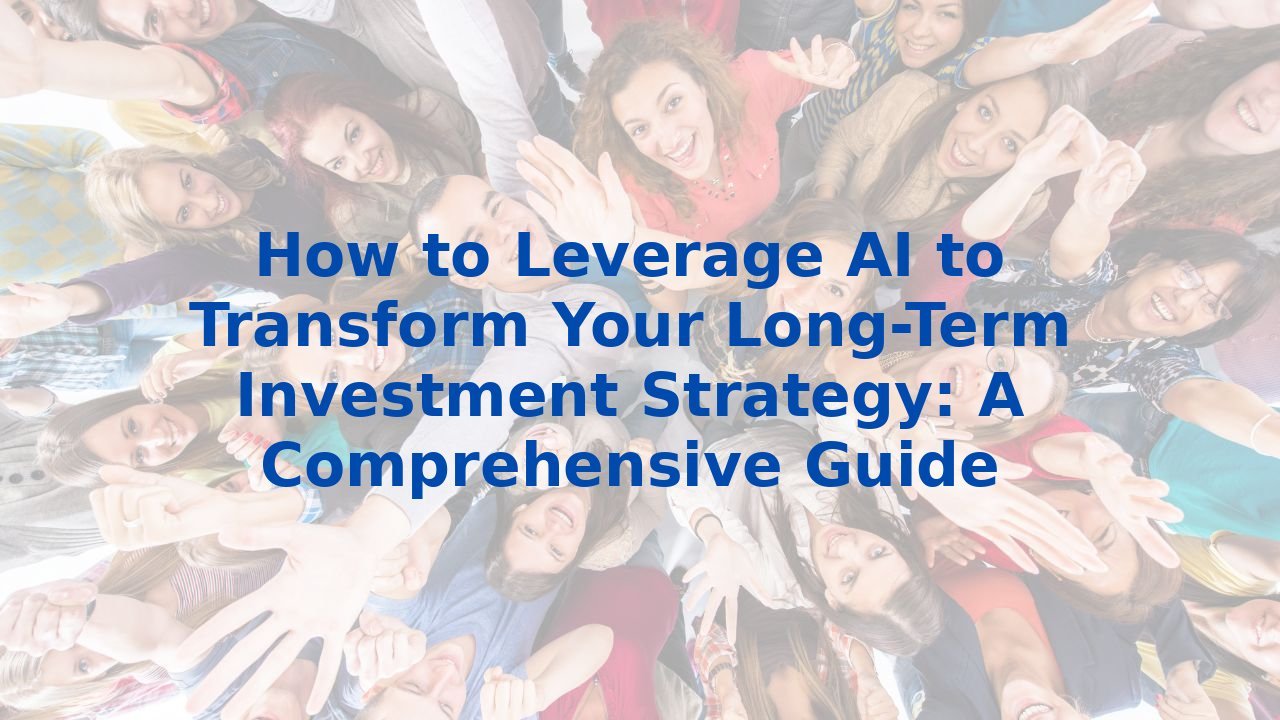How to Leverage AI to Transform Your Long-Term Investment Strategy: A Comprehensive Guide
How to Leverage AI to Transform Your Long-Term Investment Strategy: A Comprehensive Guide
Enhancing Business Processes with AI: The Key to Efficiency
In the ever-evolving landscape of business, organizations are ceaselessly on the lookout for innovative ways to optimize their operations while enhancing efficiency. Artificial Intelligence (AI) stands out as a transformative tool that can radically change how companies operate. By integrating AI into core functions, businesses can streamline workflows, automate monotonous tasks, and make data-driven decisions. This ultimately elevates productivity and positions them better in an intensely competitive market.
Automating Routine Tasks
At the forefront of AI’s contribution to business process optimization is its extraordinary capacity to automate routine tasks. Imagine a world where data entry, inventory management, and even customer support are efficiently managed without incessant human intervention. AI-powered chatbots serve as exemplars of this, handling routine inquiries with instantaneous responses, thereby allowing human agents to focus on complex challenges. Similarly, advanced AI systems can extract and input data from critical documents, presenting a dual benefit of reducing manual errors and accelerating processes.
Advanced Data Analytics
AI is not merely a tool for automation; its capability to process vast quantities of data unlocks valuable insights that can transform business strategies. By analyzing customer behavior across various platforms, AI can create tailored offerings and forecast future trends. This not only refines marketing strategies but also enhances customer engagement significantly. Furthermore, by scouring online landscapes—such as social media or news articles—AI enables businesses to stay agile and proactive, adapting strategies before shifting market conditions ensue.
Predictive Maintenance
Imagine reducing unexpected downtimes to a bare minimum. AI facilitates this dream through predictive maintenance, monitoring equipment performance and forecasting potential failures. Such foresight alleviates costly downtime while ensuring seamless operations. Businesses harnessing AI-driven predictive analytics can identify and rectify potential issues before they escalate, honing operational efficiency and aligning performance with business goals.
Process Optimization
With AI, the management of business processes transitions into a new age. Through methodologies like process mining, companies can utilize AI algorithms to analyze their operational footprints. This helps in identifying bottlenecks and inefficiencies that might go unnoticed. By uncovering these critical insights, businesses can fine-tune workflows, leading to enhanced efficiency.
Real-Time Monitoring and Automation
The ability of AI to facilitate real-time monitoring and automation is another cornerstone of enhancing business processes. Picture this: manual tasks that once consumed hours of labor are now handled by software bots, effectively expediting processes, minimizing human error, and drastically reducing costs. Such automation allows employees to devote energy to strategic, higher-value functions, amplifying the impact of human capital within the organization.
Decision-Making and Compliance
AI enables more informed and rational decision-making. By collating structured and unstructured data from various sources, AI uncovers patterns that inform decision processes. This rich influx of information facilitates clearer risk assessments and opportunity recognition. Moreover, the consistency of AI ensures compliance with industry standards, mitigating the risks associated with regulatory penalties.
Employee Productivity Enhancement
Finally, the integration of AI contributes to a significant boost in employee productivity. By automating mundane tasks and offering intelligent support tools—like virtual assistants—AI frees professionals to engage with value-adding responsibilities. It even paves the way for personalized learning experiences, recommending training modules aligned with individual performance and career aspirations, thus promoting job satisfaction and retention.
The Benefits of Training Your Employees for AI
While AI serves as a robust vehicle for optimizing business processes, it’s essential to activate its potential through well-trained employees. The benefits of investing in AI training are manifold:
- Adaptability: Trained employees can transition smoothly into AI-enhanced environments, ensuring operational fluidity.
- Problem-Solving: A workforce skilled in AI is adept at diagnosing and resolving automation-related challenges efficiently.
- Innovation: With the knowledge to leverage AI, employees are primed to devise creative solutions that enhance business processes.
- Efficiency: Understanding AI functionality enables employees to innovate their workflows, driving increased productivity and fewer errors.
Conclusion
In essence, AI is reshaping the dynamics of business process optimization. From automating mundane tasks to enhancing data analytics and facilitating predictive maintenance, it is revolutionizing the operational landscape. By embracing AI, organizations can streamline their workflows, lower costs, and achieve superior performance outcomes. However, the true value unfolds when employees are educated to harness AI effectively. This commitment to training ensures sustained growth and competitiveness in a swiftly advancing digital landscape. As we look to the future, the integration of AI will be pivotal in helping businesses maintain their edge and secure long-term success.



